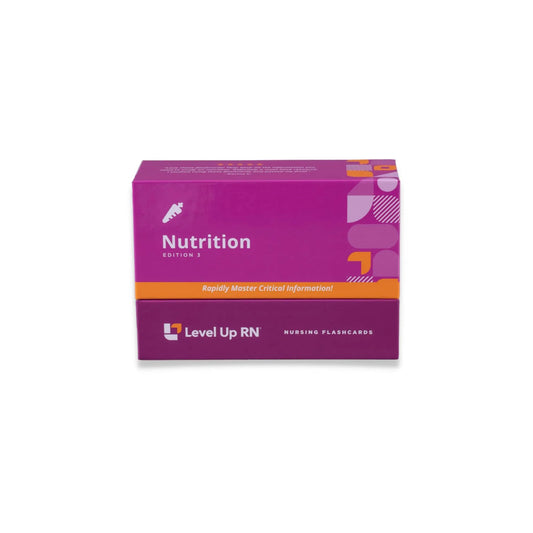Hi, I'm Cathy with Level Up RN. In this video, I'm going to continue my coverage of topics from our Level Up RN Nutrition Flashcard deck. Specifically, I'll be talking about water, including the role of water in the body, the recommended daily intake of water, types of water loss, and signs and symptoms of dehydration. And then at the end of the video, I'm going to give you guys a little quiz to test your understanding of some of the key points I'll be covering. So definitely stay tuned for that. And if you have our flashcards, go ahead and pull out your flashcard on water so you can follow along with me.
Water is essential in all body processes, including temperature regulation, blood pressure regulation, lubrication and cushioning of joints, and waste removal, just to name a few. The recommended daily intake for an adult is approximately 30 milliliters per kilogram of body weight, so about 2 to 3 liters per day. However, increased water intake is needed for hot temperatures, exercise, fever, diarrhea, and vomiting. Under normal conditions, fluid intake should approximately equal fluid output. Fluid output includes both sensible water loss and insensible water loss. Sensible water loss is water loss that can easily be measured, such as urine output. Insensible water loss is water loss that cannot easily be measured, such as water loss through sweating or respirations.
Insufficient intake of water can lead to dehydration, which, if left untreated, can be life-threatening. And it is essential in nursing school that you know the signs and symptoms of dehydration. This includes weight loss, tachypnea, tachycardia, hypotension, decreased urine output, decreased skin turgor, dried mucous membranes, and a weak, thready pulse.
All right. It's quiz time, and I've got three questions for you.
Question number 1. How should fluid intake compare with fluid output?
The answer is, they should be approximately equal.
Question number 2. Is water loss due to sweating considered sensible or insensible water loss?
The answer is insensible because it is not easily measured.
Question number 3. Symptoms of dehydration include a decrease in heart rate. True or false?
The answer is false. Dehydration results in fluid volume deficit, which causes the blood pressure to drop, and then the body compensates by increasing the heart rate.
All right. That's it for this video. I hope it was helpful. Take care, and good luck with studying.
[BLOOPERS]
The recommended intake for an adult is about 30 milliliters per kilogram per-- of ber, ber, ber, ber.


